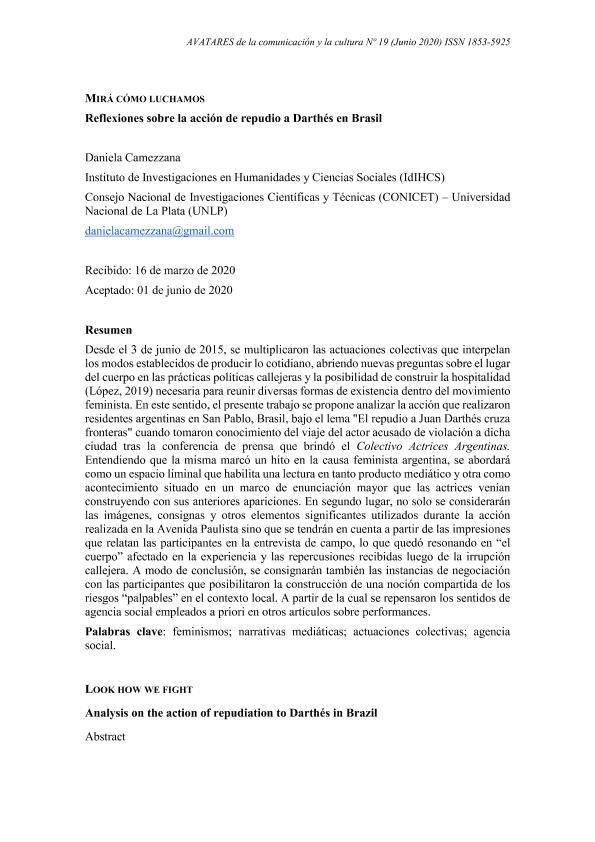Artículo
Desde el 3 de junio de 2015, se multiplicaron las actuaciones colectivas que interpelan los modos establecidos de producir lo cotidiano, abriendo nuevas preguntas sobre el lugar del cuerpo en las prácticas políticas callejeras y la posibilidad de construir la hospitalidad (López, 2019) necesaria para reunir diversas formas de existencia dentro del movimiento feminista. En este sentido, el presente trabajo se propone analizar la acción que realizaron residentes argentinas en San Pablo, Brasil, bajo el lema "El repudio a Juan Darthés cruza fronteras" cuando tomaron conocimiento del viaje del actor acusado de violación a dicha ciudad tras la conferencia de prensa que brindó el Colectivo Actrices Argentinas. Entendiendo que la misma marcó un hito en la causa feminista argentina, se abordará como un espacio liminal que habilita una lectura en tanto producto mediático y otra como acontecimiento situado en un marco de enunciación mayor que las actrices venían construyendo con sus anteriores apariciones. En segundo lugar, no solo se considerarán las imágenes, consignas y otros elementos significantes utilizados durante la acción realizada en la Avenida Paulista sino que se tendrán en cuenta a partir de las impresiones que relatan las participantes en la entrevista de campo, lo que quedó resonando en “el cuerpo” afectado en la experiencia y las repercusiones recibidas luego de la irrupción callejera. A modo de conclusión, se consignarán también las instancias de negociación con las participantes que posibilitaron la construcción de una noción compartida de los riesgos “palpables” en el contexto local. A partir de la cual se repensaron los sentidos de agencia social empleados a priori en otros artículos sobre performances. Since June 3, 2015, collective actions that question the established ways of producing the daily life, opening new questions about the place of the body in street political practices and the possibility of building the hospitality necessary to gather various forms of existence inside the feminist movement. In this sense, the present work intends to analyze the action carried out by Argentine residents in São Paulo, Brazil, under the slogan "The repudiation of Juan Darthés crosses borders" when they took knowledge about the trip of the actor accused of rape after the conference press provided by the Actresses Argentinas Collective. Understanding that it marked a milestone in the Argentine feminist cause, it will be approached as a liminal space that enables a reading as a media product and another as an event inscribed in a framework of greater enunciation that the actresses had been building with their previous appearances. Secondly, not only will the images, slogans and other significant elements used during the action carried out on Avenida Paulista be considered, also be taken into account the impressions of the participants expressed in the interview, which resonated in " the body” affected by the experience and the repercussions received after the street performance. By way of conclusion, the negotiation instances with the participants that made possible the construction of a common notion of “feel” risks in the local context will also be included. From which the senses of social agency used a priori in other articles on performances were reviewed.
Mirá cómo luchamos: Reflexiones sobre la acción de repudio a Darthés en Brasil
Título:
Look how we fight: Analysis on the action of repudiation to Darthés in Brazil
Fecha de publicación:
06/2020
Editorial:
Universidad de Buenos Aires. Facultad de Ciencias Sociales
Revista:
Avatares
e-ISSN:
1853-5925
Idioma:
Español
Tipo de recurso:
Artículo publicado
Clasificación temática:
Resumen
Palabras clave:
Feminismos
,
Narrativas Mediáticas
,
Actuaciones Colectivas
,
Agencia Social
Archivos asociados
Licencia
Identificadores
Colecciones
Articulos(IDIHCS)
Articulos de INST.DE INVEST.EN HUMANIDADES Y CS SOCIALES
Articulos de INST.DE INVEST.EN HUMANIDADES Y CS SOCIALES
Citación
Camezzana, María Daniela; Mirá cómo luchamos: Reflexiones sobre la acción de repudio a Darthés en Brasil; Universidad de Buenos Aires. Facultad de Ciencias Sociales; Avatares; 19; 6-2020; 1-19
Compartir




